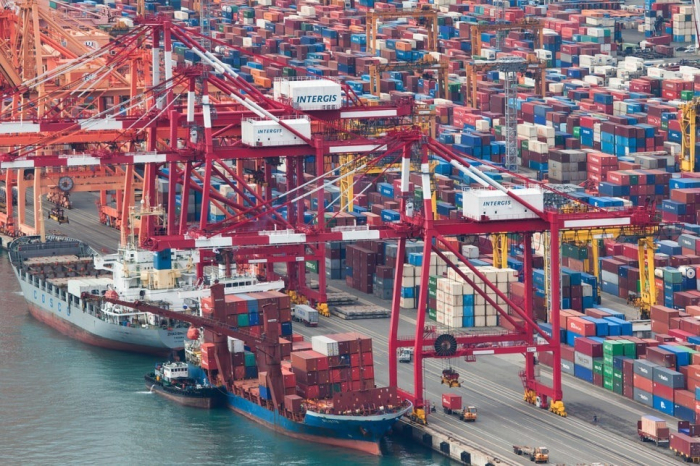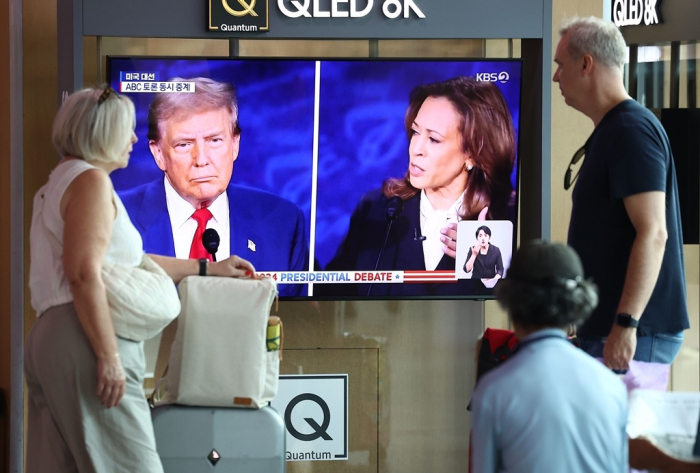Economy
Korea’s export growth at 7-month low amid growing external risk
Exports up 4.6% in October, the slowest growth since March; uncertainties grow over the US election, geopolitical tensions
By Nov 01, 2024 (Gmt+09:00)
2
Min read
Most Read
LG Chem to sell water filter business to Glenwood PE for $692 million


KT&G eyes overseas M&A after rejecting activist fund's offer


Mirae Asset to be named Korea Post’s core real estate fund operator


StockX in merger talks with Naver’s online reseller Kream


Meritz backs half of ex-manager’s $210 mn hedge fund



South Korea’s export growth slowed to a seven-month low in October despite strong shipments of semiconductors and automobiles, stoking concerns that Asia’s fourth-largest economy is losing momentum amid growing uncertainties over the US presidential election and geopolitical tensions.
Exports rose 4.6% to $57.5 billion in October from a year earlier, extending the growth streak to 13 months, data from the Ministry of Trade, Industry and Energy showed on Friday. Last month's growth was the slowest since March, however.
Overseas sales adjusted for working-day differences dipped 0.2% last month on-year, marking its first decline since October 2023, according to separate data from the customs office.
“From now on, favorable base effects, partly related to global oil prices and semiconductor prices, start to fade away, so headline export growth is expected to decelerate,” said ING in a note.
Korea’s economy rebounded slower in the third quarter than the central bank forecasted. Exports have been slowing since August.
GROWING UNCERTAINTIES
The government warned of growing risk from the upcoming US presidential election on Nov. 5 and geopolitical tensions in the Middle East and Ukraine, while pledging to do its best to maintain export momentum.
“It is difficult to predict when risk factors such as tensions in the Middle East and the war between Russia and Ukraine will end, while uncertainties over the external trade environment remain due to the US election and others,” said Minister of Trade, Industry and Energy Ahn Dukgeun in a statement.
“Uncertainties surrounding our trade environment have increased slightly as the outcome of the US presidential election is expected to change US economic and trade policies,” said Ahn.
The Korean government will strive to secure maximum interests for the country and its industries, he added.

STRONG SEMICONDUCTOR, CAR EXPORTS
Korea’s overseas sales of semiconductors, its top export item, leaped 40.3% to $12.5 billion in October from a year earlier. The country is home to the world’s two largest memory chipmakers, Samsung Electronics Co. and SK Hynix Inc.
Microchip exports may slow in the fourth quarter as separate data showed its production fell 2.6% in September over the previous month — the first decline in 15 months, industry sources said.
Automobile exports grew 5.5% to $6.2 billion in October, while overseas shipments of steel products increased 8.8% to $2.9 billion, snapping an eight-month-long slide.
Exports to China, Korea’s largest overseas market, rose 10.9% to a 25-month high of $12.2 billion thanks to strong shipments of semiconductors and petrochemical products. Sales to the US gained 3.4% to $10.4 billion.
Korea’s imports edged up 1.7% to $54.4 billion, resulting in a trade surplus of $3.2 billion.
Write to Yeong-Hyo Jeong at hugh@hankyung.com
Jongwoo Cheon edited this article.
More to Read
-
 EarningsSamsung’s memory business fares better in Q3; more HBM sales ahead
EarningsSamsung’s memory business fares better in Q3; more HBM sales aheadOct 31, 2024 (Gmt+09:00)
5 Min read -
 EarningsSK Hynix’s Q3 profit soars to record high, beats Samsung’s memory profit
EarningsSK Hynix’s Q3 profit soars to record high, beats Samsung’s memory profitOct 24, 2024 (Gmt+09:00)
4 Min read -

-
 EconomyS.Korea’s exports fall 2.9% in first 20 days of October; chip sales strong
EconomyS.Korea’s exports fall 2.9% in first 20 days of October; chip sales strongOct 21, 2024 (Gmt+09:00)
2 Min read -
 Business & PoliticsS.Korean defense firms stand to gain if Harris wins Nov. election
Business & PoliticsS.Korean defense firms stand to gain if Harris wins Nov. electionOct 07, 2024 (Gmt+09:00)
2 Min read
Comment 0
LOG IN


